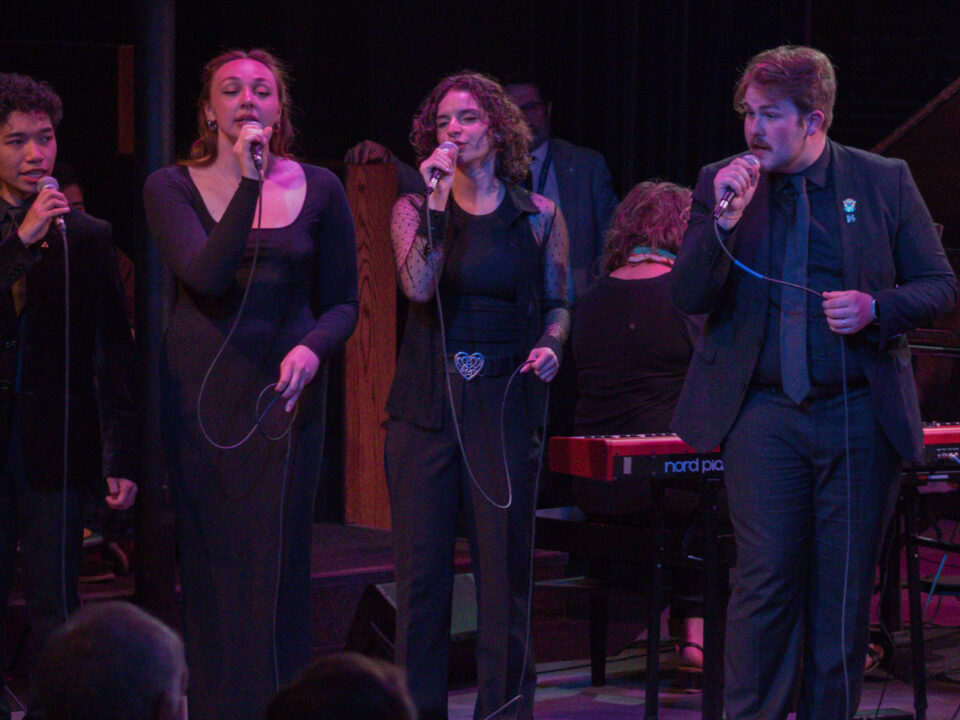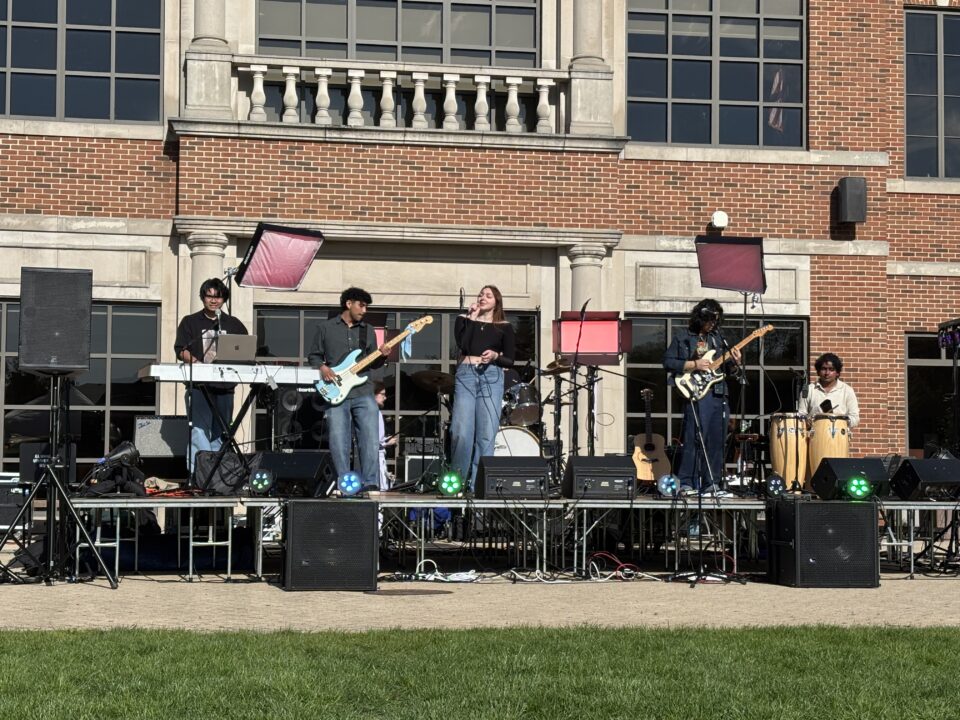10 favorites from The Leader’s retiring critic
Since Fall 2017, I have been the film critic for this university’s newspaper, and have been proud to be in the same pages as so many immensely talented fellow students, again and again. During my tenure, I have reviewed dozens and seen hundreds of movies. With my time at Elmhurst University drawing to a close, I thought I’d make a list of the ten best movies to be released while I’ve been a student. I don’t just intend for this to be a tribute to film, but to The Leader, which has continually given me a place to share my voice and love of movies with you, the readers, whom I am just as deeply grateful toward.
According to my film diary, I have rated 21 movies released during my college career 5 Stars, which is my highest rating. Narrowing those amazing films into a list of ten was difficult, so I’ve included the names of the honorable mentions beneath the main picks.
- Madeline’s Madeline (2018, Josephine Decker)
There’s a distasteful detachment, a pokey-pity to most movies about mental illness. Not since John Cassavettes’ “A Woman Under the Influence” (1974) have we received a movie so sympathetic to the reality of mental deterioration, but unlike that film, director Josephine Decker experiments with everything we know about cinema to give us an otherworldly-yet-wholly-grounded perspective into a troubled teenager’s mind. My favorite performance of the last decade, without question, is Helena Howard’s as Madeline.
- Roma (2018, Alfonso Cuarón)
There is a ghostly love pouring through every shot of Alfonso Cuarón’s masterpiece. It is simultaneously the most understated and epic film of his career, foregoing the impressive-yet-gimmicky nature of films like “Gravity” and embracing an ethereal, incantatory tone that can best be compared to the poetic surreality of Andrei Tarkovsky. “Roma,” on a minute-to-minute basis, achieves what few other films muster in their entirety.
- Vox Lux (2018, Brady Corbet)
A film so masterfully original, it all but murdered the filmmaking future of Brady Corbet. In his own words, “nobody really asked for this,” and while that’s certainly true, it’s also the truest possible testament to what is so special about this haunting, shocking, and achingly beautiful musical drama. It quietly entered the scene and exited with as much attention as it brought (next to none), but those who have watched it know that its spirit is anything but mousey. Indeed, there’s so much that’s mind-blowing about “Vox Lux,” one feels astonishment when it is over that it didn’t create a bigger splash. So it is my hope that by including this film on my list, I am also extending it to all of you as a gift for a movie night when your senses need something completely, unpredictably different. If you need further incentive, Natalie Portman gives the performance of a lifetime.
- A Hidden Life (2019, Terrence Malick)
It’s a given by now that Malick is a love-him-or-hate-him director, so for many of his films I err on the side of caution when I recommend them. But, if I had to send intergalactic life one film to explain the human race, it would be “A Hidden Life.” It is Malick’s return to the straightforward narrative, but there’s nothing simple about this WWII-set story that isn’t about the war so much as the people who opted for peace, and were torn asunder because of it. Few films contain every emotion. This one has them all, and like the most powerful poetry, imparts new feelings onto the viewer.
- Waves (2019, Trey Edward Schultz)
There will come a point in “Waves” when you think it will be impossible for light to shine through the lives of these characters ever again, and in a completely realistic and honest way, hope still manages to find a way, even as it showers none on the worst events. This is not a film that believes everything happens for a reason, even as it exists in a medium where you will be continually taught “everything must happen for a reason.” There is tremendous horror and beauty in the inexplicable. Here is an American cinematic masterpiece: An electrifyingly truthful story about life prospering in the wake of unforgivable events. It is as grim as we’ve come to expect of Trey Edward Schultz (director of the traumatizing “It Comes at Night”), and yet it is still a glorious experience that will leave your heart full. It is a movie that is so powerful, you will be confused by how effortlessly it reaches inside you, takes the broken pieces from your own life, and returns them in shapes that finally seem to make sense.
- You Were Never Really Here (2017, Lynne Ramsay)
The briefest film on this list, and as such, it comes across as a frantic rush when compared to the several 3-plus-hour experiences I’ve included. But the execution of “You Were Never Really Here” and the unforgettable mark it leaves on the viewer is a miracle when you consider an entire hour of the original Cannes Film Festival cut isn’t readily available to us. Rather than be dismayed and pull a Josh Trank and blame the world for maiming their passion project (let’s face it, “Fantastic Four” (2015) was going to be terrible no matter what), master filmmaker Lynne Ramsay used the shortened span as an opportunity to make the story creepier, more elliptical, more horrifying, and more poignant. It’s a movie that succeeds in the power of its seconds rather than its extensions, of which there are none: This is a movie with no extra room to spare. Every frame is fundamental to telling us a story told entirely from the exhausted tornado of post traumatic stress disorder.
- An Elephant Sitting Still (2018, Hu Bo)
I can’t imagine many of you would want to spend 4 hours of your day watching a film soaked in the specter of suicide. Just from that sentence, I would not cast blame on you for skipping this section. But “An Elephant Sitting Still,” the first and last feature film by Chinese filmmaker and novelist Hu Bo before he tragically took his own life after producers threatened his artistic vision, is undoubtedly an important, life-altering experience. I sincerely believe that anybody who gives it a chance will see what I mean, and I also must stress that this isn’t a difficult film to physically pay attention to: The cinematography is breathtaking, every long shot a short film with how much it contains. The performances are naturalistic yet enthralling. The writing boasts some of the fiercest, most spine-tingling lines of the last decade. This movie looks into the heart of the abyss, and yet it still contains so many returns. It really must be seen.
- Twin Peaks: The Return (2017, David Lynch)
My friends and I have gone back and forth about whether this is a gigantic movie or truly a miniseries that should be treated as such. At the end of the day, I am not sure it matters, I’m just infinitely pleased that it exists. It provides lifelong fans of the short lived early 90s series with an ever expanding story, but it is also David Lynch’s platform to do whatever the hell he wants for 1,000 minutes. This kind of freeflow artistic freedom would be nauseating in many other hands, but in Lynch’s we get an overwhelming summation of themes, emotions, and ideas that have been gestating in the great man since long before “Twin Peaks” was even an idea. This isn’t a head-scratching fall into nowhere, but a tear-jerking rollercoaster ride through the best and worst of ourselves: As consumers of media, as artists and dreamers, as survivors making it through the human race. Reality seems less real after binging “The Return.”
- Too Old to Die Young (2019, Nicolas Winding Refn)
Where it is hard to pin down what exactly “The Return” is, I do believe this batshit crazy 2019 project is a film, but one that is way too long to ever find life in a theater. It is Refn shedding all of the pretensions of his early career and coming fully into his own as a modern master of the horrific art film. “Too Old to Die Young” never wants to be scary in the ways we expect cinema to scare us; it wants to damn near drown us in the kinds of darkness that’s impossible to articulate in language. Instead of Good vs. Evil, we get Evil vs. Worse Evil, and the complex, broken minds and hearts operating on both sides. More than being a constant shock to the senses, “Too Old to Die Young” is frequently hilarious, bizarre, wonderfully moving and exceptionally well acted, boasting career best performances from Miles Teller, John Hawkes, and Jena Malone. Watching this truly was one of the most intense engagements I’ve ever had with art of any kind.
- Phantom Thread (2017, Paul Thomas Anderson)
It is always a head-scratching shock to find out what the next Paul Thomas Anderson film will be, because the writer-director is never somebody to pin themselves into a single, predictable corner. Like the fiercest artists, Anderson is always striking out of expectations and creating stories that contain new ideas, thrilling images and distinct energies. “Phantom Thread” feels like the end of an era, as it sports a final, towering performance from Daniel Day-Lewis, but in keeping with both the actor and director’s total commitment to story, “Phantom Thread” isn’t mournful, but darkly romantic and twistedly riveting. It is a lush, psychotic love story ensnared in clothes, deception, insecurity, and poison. It makes one of the grandest statements in romantic storytelling, suggesting that sometimes the things which tear us apart are exactly the things that keep us together. In the words of Ja Rule, “love is about pain.”
Honorable mentions (in no particular order):
Let the Sunshine In (2017, Claire Denis)
Parasite (2019, Bong Joon-ho)
Good Time (2017, The Safdie Bros.)
The Florida Project (2017, Sean Baker)
Long Day’s Journey Into Night (2018, Bi Gan)
Call Me by Your Name (2017, Luca Guadagnino)
Climax (2018, Gaspar Noé)
John Wick: Chapter 2 (2017, Chad Stahelski)
Once Upon a Time in Hollywood (2019, Quentin Tarantino)
The Irishman (2019, Martin Scorsese)
Spider-Man: Into the Spider-Verse (2018, Peter Ramsey, Rodney Rothman, Bob Persichetti)


